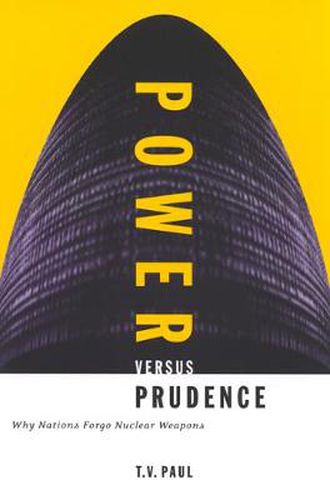Readings Newsletter
Become a Readings Member to make your shopping experience even easier.
Sign in or sign up for free!
You’re not far away from qualifying for FREE standard shipping within Australia
You’ve qualified for FREE standard shipping within Australia
The cart is loading…






With the end of the Cold War, nuclear non-proliferation has emerged as a central issue in international security relations. While most existing works on nuclear proliferation deal with the question of nuclear acquisition, T.V. Paul explains why some states over 185 at present have decided to forswear nuclear weapons even when they have the technological capability or potential capability to develop them, and why some states already in possession of nuclear arms choose to dismantle them. In Power versus Prudence Paul develops a prudential-realist model, arguing that a nations national nuclear choices depend on specific regional security contexts: the non-great power states most likely to forgo nuclear weapons are those in zones of low and moderate conflict, while nations likely to acquire such capability tend to be in zones of high conflict and engaged in protracted conflicts and enduring rivalries. He demonstrates that the choice to forbear acquiring nuclear weapons is also a function of the extent of security interdependence that states experience with other states, both allies and adversaries. He applies the comparative case study method to pairs of states with similar characteristics Germany/Japan, Canada/Australia, Sweden/Switzerland, Argentina/Brazil in addition to analysing the nuclear choices of South Africa, Ukraine, South Korea, India, Pakistan, and Israel. Paul concludes by questioning some of the prevailing supply side approaches to non-proliferation, offering an explication of the security variable and its linking of nuclear proliferation with protracted conflicts and enduring rivalries. Power versus Prudence will be of interest to students of international relations, policy-makers, policy analysts, and the informed public concerned with the questions of nuclear weapons, non-proliferation, and disarmament. T.V. Paul is an associate professor in the Department of Political Science, McGill University. He has published several books and numerous articles on international security and the politics of nuclear weapons, including Asymmetric Conflicts: War Initiation by Weaker Powers, The Absolute Weapon Revisited: Nuclear Arms and the Emerging International Order, and International Order and the Future of World Politics.
$9.00 standard shipping within Australia
FREE standard shipping within Australia for orders over $100.00
Express & International shipping calculated at checkout
With the end of the Cold War, nuclear non-proliferation has emerged as a central issue in international security relations. While most existing works on nuclear proliferation deal with the question of nuclear acquisition, T.V. Paul explains why some states over 185 at present have decided to forswear nuclear weapons even when they have the technological capability or potential capability to develop them, and why some states already in possession of nuclear arms choose to dismantle them. In Power versus Prudence Paul develops a prudential-realist model, arguing that a nations national nuclear choices depend on specific regional security contexts: the non-great power states most likely to forgo nuclear weapons are those in zones of low and moderate conflict, while nations likely to acquire such capability tend to be in zones of high conflict and engaged in protracted conflicts and enduring rivalries. He demonstrates that the choice to forbear acquiring nuclear weapons is also a function of the extent of security interdependence that states experience with other states, both allies and adversaries. He applies the comparative case study method to pairs of states with similar characteristics Germany/Japan, Canada/Australia, Sweden/Switzerland, Argentina/Brazil in addition to analysing the nuclear choices of South Africa, Ukraine, South Korea, India, Pakistan, and Israel. Paul concludes by questioning some of the prevailing supply side approaches to non-proliferation, offering an explication of the security variable and its linking of nuclear proliferation with protracted conflicts and enduring rivalries. Power versus Prudence will be of interest to students of international relations, policy-makers, policy analysts, and the informed public concerned with the questions of nuclear weapons, non-proliferation, and disarmament. T.V. Paul is an associate professor in the Department of Political Science, McGill University. He has published several books and numerous articles on international security and the politics of nuclear weapons, including Asymmetric Conflicts: War Initiation by Weaker Powers, The Absolute Weapon Revisited: Nuclear Arms and the Emerging International Order, and International Order and the Future of World Politics.